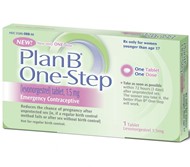Emergency Contraception
Morning After Pill: Preventing Pregnancy
![]()
Emergency Contraception |
 |
Emergency Contraceptive PillsContents • What Is The Emergency Contraceptive Pill? |
|
Back To Main Article: Birth Control Methods |
What Is The Emergency Contraceptive Pill?
Also known as the morning after pill, it is a medication taken to prevent pregnancy AFTER unprotected sexual intercourse. It needs to be taken either within 72 (3 days) or 120 hours (5 hours, depending on the brand) to be effective. It is similar to the normal daily contraceptive pill but contains a much higher dosage of hormones. You may need to take emergency contraception because the contraception you used when you had intercourse failed (for example your condom broke) or because you didn't use contraception. Typically a packet of emergency contraceptives contains 1 or 2 pills and this is sufficient, if taken in time, to prevent conception.
If taken according to the instructions on the packet, emergency contraception is 90 to 95 percent effective in preventing pregnancy. The sooner it is taken, the more effective it is likely to be. There are a few different types of emergency contraceptives, and some are slightly more effective than others. For more, read: how effective is emergency contraception? It is also worth remembering that the morning after pill will not protect you from HIV infection (the virus that causes AIDS) or any other sexually transmitted diseases (STDs).
The morning after pill interferes with the ovulation process by slowing the movement of the egg down the fallopian tube, so that it is less likely to meet sperm. It also alters the lining of the womb so that a fertilized egg cannot implant. It does not cause you to have a period or affect your menstrual cycle. You should have your period at the expected time. Is It The Same As The Abortion Pill? No, the abortion pill (Mifeprex, also called RU-486 and mifepristone) and the morning after pill are two different products. The morning after pill does not cause an abortion. Instead it works by preventing pregnancy in the first place. It cannot end a pregnancy that has already begun - which is why it won't work if taken outside of the recommended 120 hours (or 72 hours depending on the brand you take). The abortion pill is very different because it ends a confirmed pregnancy. It does this by making the womb expel the egg, ending the pregnancy, up to 49 days after it is confirmed. Mifeprex is only available on prescription after consultation with your doctor. When purchased direct from a pharmacy the morning after pill can cost between $35 and $60. The manufacturers of Plan B One-Step are offering a $10 coupon. To print it, visit their website: www.planbonestep.com/coupon.aspx. If you need help with the costs, many local health departments offer free emergency contraceptive to lower income women. To locate your nearest health department look at the government listings usually found at the front of your phone book. Alternatively google your county name and the words 'public health' or 'health department'. You could also contact your local Planned Parenthood Center which offer a 'sliding fee scale', depending on your income. If you have Medicaid coverage, it should cover you for the full cost of the morning after pill in most states. Emergency contraceptives have no long-term or serious side effects and are safe for most women to use. If you do experience side effects they may include: When To Call A Doctor If you experience severe tummy pain, you may have an ectopic pregnancy and should seek immediate medical attention.
Related Articles |
| Related Articles on Contraceptives
For more, see the following: • Recommended health screenings for women. Back to Homepage: Womens Health Advice |
|
WOMENS HEALTH ADVICE: ABOUT BIRTH CONTROL |